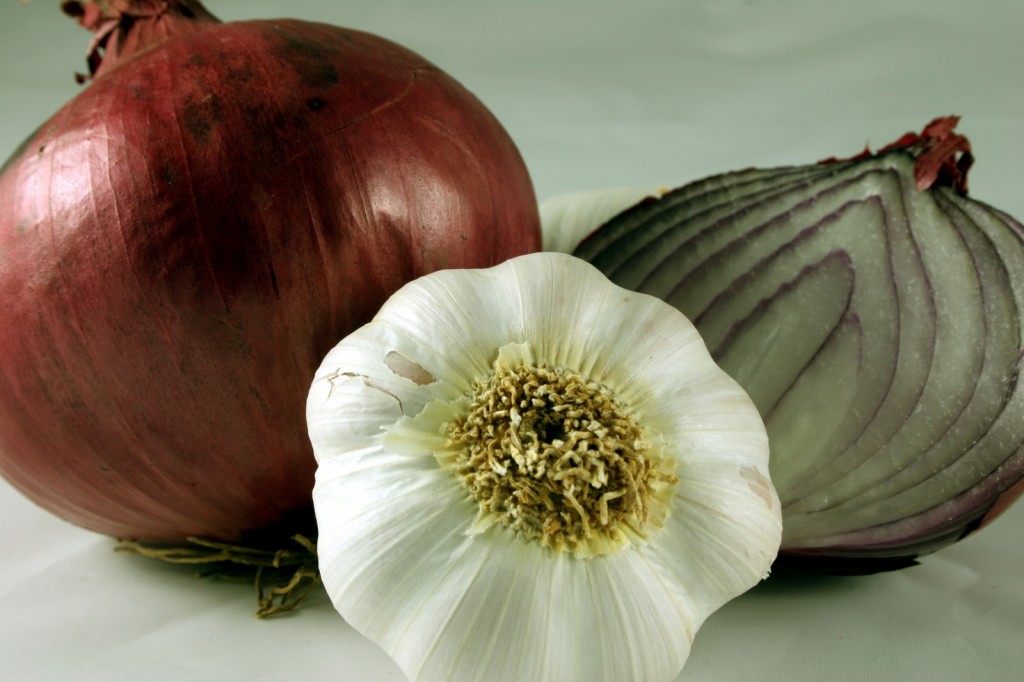This post may contain affiliate links which won’t change your price but will share some commission.
Most everyone has heard of probiotics but what about prebiotics? Have you heard of them? Do you know what they do?]
Let’s start with a definition. According to the Google dictionary prebiotics are “a nondigestible food ingredient that promotes the growth of beneficial microorganisms in the intestines.” the beneficial organisms being the probiotics. Or as Mark of the Daily Apple puts it, ” it is food for your flora.”

Onions and Garlic, 2 prebiotic foods that feed our probiotic bacteria.
It stands to reason that if we want to have probiotic or beneficial bacteria or yeast in our intestines we should take care of them properly. After all if we want them to stay we should feed and nourish them, don’t you think? So the question remains how do we do that?
Prebiotics are soluble fiber. Insoluble fiber is the stuff that our body is not able to digest but it helps our bowels to move easily and regularly. Soluble fiber feeds the beneficial bacteria and is found in starchy tubers, squash, and peeled fruits. The fancy names for soluble fiber are inulin and oligofructose, along with fructooligosaccharides (FOS), galactooligosaccharides (GOS), and other oligosaccharides. What foods contain these prebiotics or soluble fiber? Here is a handy chart also from Mark’s Daily Apple.
In parentheses is the prebiotic fiber content by weight, followed by the amount of food required to obtain 6 g prebiotic fiber:
- Raw Jerusalem artichoke (31.5%) – 3/4 oz
- Raw dandelion greens (24.3%) – 1 oz
- Raw garlic (17.5%) – 1.2 oz
- Raw leek (11.7%) – 1.8 oz
- Raw onion (8.6%) – 2.5 oz
- Cooked onion (5%) – 1/4 lb, or 4 oz
- Raw banana (1%) – 1.3 lb
Inulin/oligofructose content (per 100g raw)
- Chicory root – 41.6 g/22.9 g
- Jerusalem artichoke – 18 g/13.5 g
- Dandelion greens – 13.5 g/10.8 g
- Garlic – 12.5 g/5 g
- Leek – 6.5 g/5.2 g
- Asparagus – 2.5 g/2.5 g
- Banana – 0.5 g/0.5 g
“As far as prebiotics go, just try to get as much variety in your plant foods as you can, in addition to supplementation with resistant starch or another prebiotic formula. Some of the best sources of soluble fiber include carrots, winter squash, summer squash (especially peeled), starchy tubers, turnips, rutabagas, parsnips, beets, plantains, taro, and yuca. Green bananas and unripe plantains (which you can dehydrate to make chips) are good whole-food sources of resistant starch.” So while you are taking and eating probiotics don’t forget to eat foods that will also feed our friendly bacteria and keep them working hard to care for our gut health.
For more info: http://chriskresser.com/what-to-do-if-you-need-to-take-antibiotics
http://www.marksdailyapple.com/prebiotics/#ixzz2uUX8L0Dk

Thank you. That was interesting and pertinent info!
Thanks for letting me know Lori.